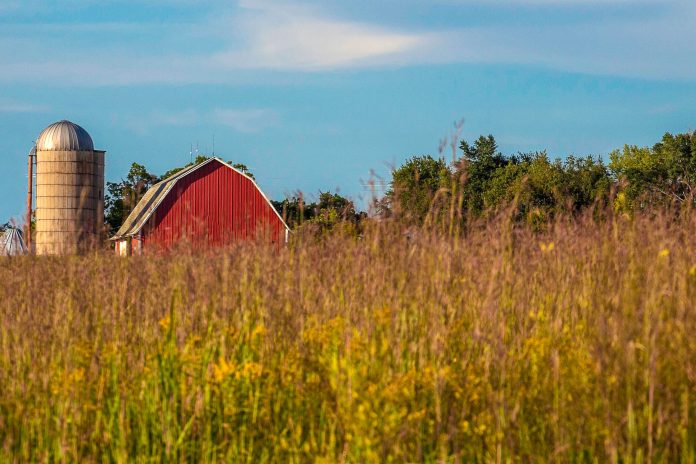Appalachia has some unique features for farming. Many farmers in Appalachia have more wooded land. Some areas may not have access to larger markets. But the number of small farms in the region has been increasing, and despite challenges, the region has a lot of potential for agriculture.
There are different types of farming that can work in Appalachia, said Tom Redfern, sustainable agriculture director for Rural Action — like livestock, or non-timber forest products, such as maple syrup or different types of berries.
Rural Action, an organization focused on building resilient communities in rural Appalachia, is working to help beginning farmers in the region take advantage of these opportunities through business planning, and setting up a network with mentor farmers.
“Historically, it is an area of poverty in Ohio, so there’s going to be some challenges,” Redfern said. “There’s unique challenges, but there’s also unique opportunities.”
Program
That’s what Rural Action is trying to emphasize in its work with beginning farmers. It recently got a U.S. Department of Agriculture National Institute of Food and Agriculture grant to support its work, and is currently doing an eight week whole farm business planning series for beginning farmers.
Whole farm planning involves looking at the land and other assets you have access to, and figuring out what you can do best with it.
“The idea is to reduce your risk by looking at multiple potential income streams,” Redfern said. “That’s also matched with your own skillset, with your land, with your aspirations.”
The series includes matching beginning farmers with mentor farmers, and weekly presentations on different aspects of business planning. The goal is to help beginning farmers take the next step for their farm, whatever that step is. Rural Action offers workshops on more specific topics, and a wide range of technical assistance for beginning farmers, like access to lawyers, accountants and more.
“We think of it as wraparound services for beginning farmers,” Redfern said.
Mentorship
This is the third year for the whole farm planning series, and the second year it has really focused on mentorship. The majority of the mentors this year were also involved with last year’s program.
“We’re kind of building this project with them,” said Molly Sowash, sustainable agriculture manager for Rural Action. “They’re doing some of the hardest work in the world, and making it work, and spending extra time sharing their experience with beginning farmers.”
Some of the mentors also helped develop the series curriculum. One of them is Abbe Turner, who raises goats in Portage County and mushrooms in Athens County.
“My interest in it was that I’ve made a lot of mistakes, and beginning farmers … they don’t need to make the same mistakes that I did. They’re going to make their own,” Turner said.
Paul Dorrance, of Pastured Providence, in Chillicothe, is an ag consultant, former farmer and a mentor in the program. He emphasized it’s about helping beginning farmers figure out what their needs are and how to address them. Years ago, he was hesitant to get involved in mentoring other farmers, because he felt like he needed more experience before he could, in his words, pretend he knew everything.
“But turns out, that’s not about that — it’s not about you at all, as a mentor,” he said. “Mentorship is about listening and meeting people where they are.”
Learning
Since the beginning farmers in the program are doing different types of farming, and are in a wide range of stages, they all have different needs. A beginning farmer, by the USDA’s definition, is anyone in their first 10 years of farming.
“In presentations, we often emphasize, take what you need from this depending on your stage of growth,” Sowash said.
That’s why beginning farmers also meet separately with their mentors, who can help them focuse on what they need specifically.
“Every day in business is different, especially right now,” Turner said. “They learn, it’s a safe environment, and we tell them that it’s OK not to have the answers, ’cause some of us don’t still, either.”
Robyn Wright-Strauss, of Adams County, who has been growing vegetables and herbs for farmers markets for two years, is currently taking the program for a second time. The first time around, she got a better understanding of the business side of farming.
“Obviously, it’s a lot of the same principles … for any small business, but looking at that through the lens of farming is really helpful,” she said.
This year, she wants to dive into the details of business planning. She has the same mentor as last year, so they’ve been able to jump right in and go deeper with some of the class topics this time. Meeting her farm mentor, Wright-Strauss said, was “life-changing.”
Having someone to ask her tough questions and help her hold herself accountable, and to give her advice has been a big help as she works on her farm business.
“I think that mentorship is so helpful for a lot of different professions and trades, not just for farming, but farming of course has it’s own special challenges,” she said.
Goals
Long-term, Sowash and Redfern want to bring that kind of support to more beginning farmers. Rural Action is working on building a network of mentors in the region that can help support each other, and beginning farmers as they grow. That way, farmers have someone to go to if they need advice or want to see how other farmers are doing things.
“If people want to have a relationship with the land and want to produce healthy food, then we certainly want to help them do that,” Turner said. “The region they’re in is ripe with opportunity.”











